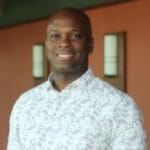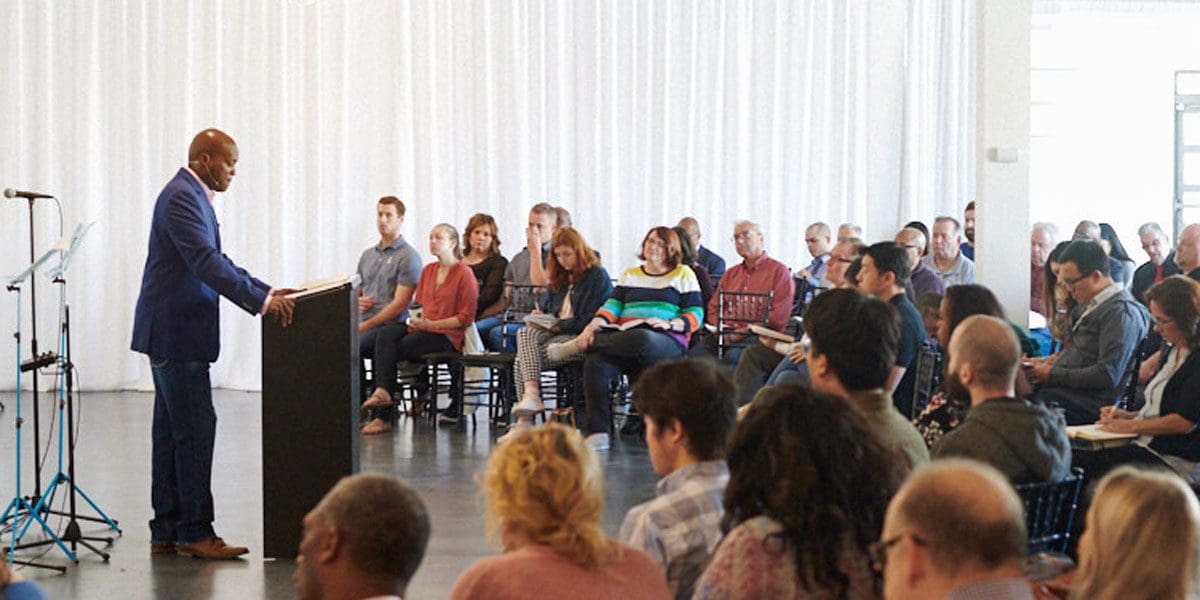Being a Christian, a pastor of a local church, and a black man has given me a unique vantage point on life. As a believer in and follower of Jesus Christ, I work hard to see how Jesus responded to different issues of his day and apply those same behaviors to my own activities of daily living. As a Christian, I have been called by God to lead unbelievers to Christ by faithfully proclaiming him with my life. As a pastor I am called to lead believers to the Holy Scriptures so that we may all learn to imitate Christ and grow in Christ-likeness.
But lately, it has been extremely difficult to navigate the thoughts, concerns, and emotions which fill my own heart. While I can’t speak on behalf of all black people, my experiences have not happened in a vacuum. I pray that my words provide a glimpse into the similar experiences of many people of color and equip us—black, brown, and white people together—to look to Jesus Christ for help and hope.
I Speak from Experience
I am a black man who has been alone in an elevator with a white woman who tightly gripped her purse in fear. I am a black man who is broken every time I hear that another black man was arrested because he “fit the description” of some other black man. I am a black man whose heart beats faster whenever a police car appears in my rear-view mirror.
For me, these recent weeks following the murder of George Floyd have been emotionally compromising, to say the least. My emotions have been all over the place. Anger, frustration, sadness, and the loss of many nights of sleep have been my experience and that of many black people throughout the world. It has been especially painful to watch friends and church members embracing polarizing positions, all because of the color of their skin.
For my wife, these days have also been challenging. She works as a physician caring for an underserved patient population. Some of the medical clinics in her group recently had to close due to violent protests. At one location, a looter at an Aldi store across the street later walked into the clinic and said, “You guys are next.” Some of the riots and destruction of property have resulted in the boarding up of local stores, thus preventing several patients (who rely on public transportation) from being able to pick up their medicines and groceries. My wife chooses to work in this underserved area. While others choose to look away from the horrors of racism, she looks into weary eyes, sees the trauma, and responds with empathy and compassion.
What the Church Can Learn
Here are five concepts my white brothers and sisters in Christ could better understand.
Experiences in the black and brown communities are remarkably different from those of white people.
The four-year-old daughter of a close friend was watching the news and listening to surrounding conversations when she asked, “Mommy, are they going to kill us, too, because we are black just like that man?” As Christians, our biblical convictions might require us to lay down our lives for the Lord (Mk. 8:35). But we should never be required to surrender our lives simply because we are black, nor because we were caught running in a neighborhood, and especially not over a fake or real $20 bill.
Racism and systemic injustices have been felt deeply by people of color for hundreds of years.
It makes a difference if laws are written but not lived. Black lives are taken because some members of our police departments are not always protecting and serving. Black lives are taken because our legal and justice systems do not consider everyone innocent before proving them guilty. Black lives are taken because our country’s leaders lack humility and unity. We all must pause to “weep with those who weep” (Rom. 12:15) over the loss of black lives before we rush to uncover the past deeds of the dead or to defend the actions of the living.
Christians and non-Christians alike are responding to pain and devastation.
Not everyone knows how to properly process their emotions. Don’t let the rioters distract you from the sentiment behind the protests or cause you to protect property while disregarding the dignity and value of every person. Remember that we Christians are called to love our neighbors even when they might be committing a grievous sin. So, we must “love one another earnestly, since love covers a multitude of sins” (1 Peter 4:8).
White Christian leaders must not hesitate to lead through crisis.
There is no need for a delay. Some people have said the Church developed a better response to COVID-19 than we did when tragedies hit black and brown communities. In this way we are failing black and brown people within our congregations. I’m certain that if a wife said her husband was physically abusing her and she feared for her life, or if a member of our biological family passed away, we would clear our calendars to address the crisis and then set up whatever long-term counseling plan was needed. Why, then, are we slow to respond during this and other racial crises? Scripture warns against a failure to love generously, for “if anyone has the world’s goods and sees his brother in need, yet closes his heart against him, how does God’s love abide in him?” (1 John 3:17).
Many people of color, in predominantly white spaces, do not freely express their thoughts and feelings.
Often they fear being misunderstood or devalued. They may want to fit in but feel completely silenced. The church should be a place of belonging where all can experience love and hope for the future, regardless of nationality, ethnicity, or cultural context.
How the Church Can Respond
Here are five practical actions the Church can implement today and in the days ahead.
Pray
My church1 is planning a peaceful prayer walk in the city of Chicago. Even if you pray alone in your own home, I encourage you to call out to the Lord, for the “prayer of a righteous person has great power as it is working” (James 5:16).
Reach out to black and brown people in your local congregation.
I had a few people call and text me to say simply that they “didn’t know what to say” except “we love you and let us know how we can serve you at this time.” They said exactly what they should have said!
Broaden your circle of friends.
As diverse as the Church is becoming, many do not have a diverse circle of friends. Invite a new friend to dinner, and seek to build a relationship by listening to his or her story.
Use your voice and relationships to help influence lasting change.
Speak to the governmental leaders in your community. Call them to action, and then hold them accountable.
Ask the Lord to search your heart and reveal any hypocrisy.
Many are set on defending their families and property from the violent protests and looters. Yet they do not defend those who are poor and defenseless, having suffered their entire lives with a lack of resources necessary to support their families.
As we consider how to move beyond this emotional moment in our nation’s history, let’s galvanize the Church to serve our neighborhoods, villages, and cities. Let’s pursue long-lasting, Christ-like living. To do this, we must first yield to the influence of the Spirit of God and not fulfill the desires of our own flesh.
Most of all, Christians must plead for people to come to Christ as we pray for regeneration. Hearts need to be changed and minds transformed by the Holy Spirit, the enabling power who is at work in all who learn and live in Christ.
—
1. The Orchard Evangelical Free Church, Chicago campus.
Photo: The Orchard



